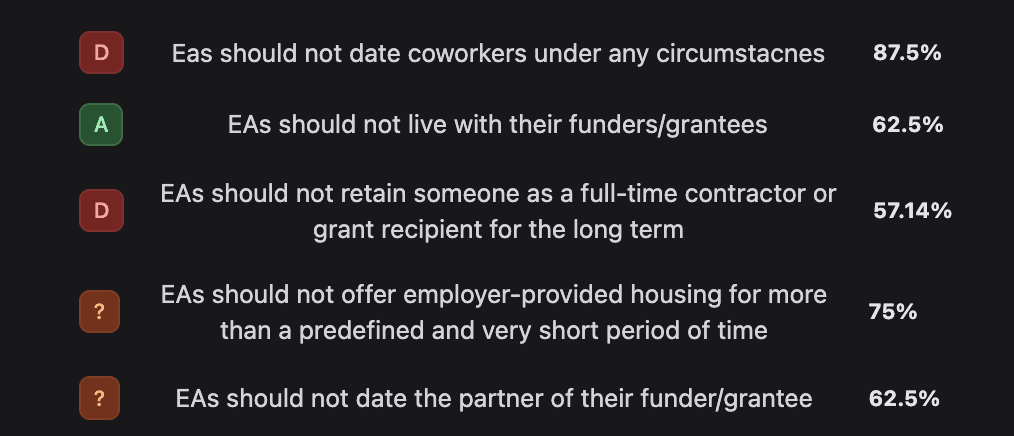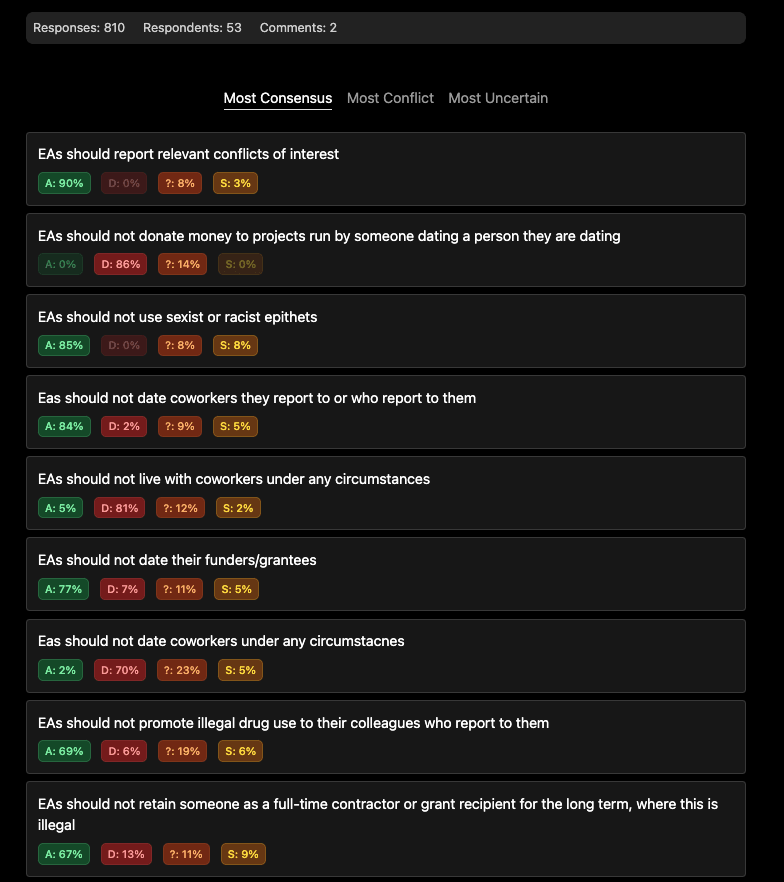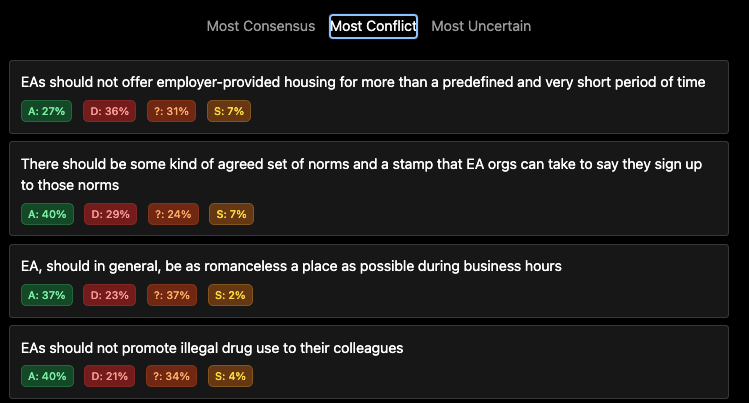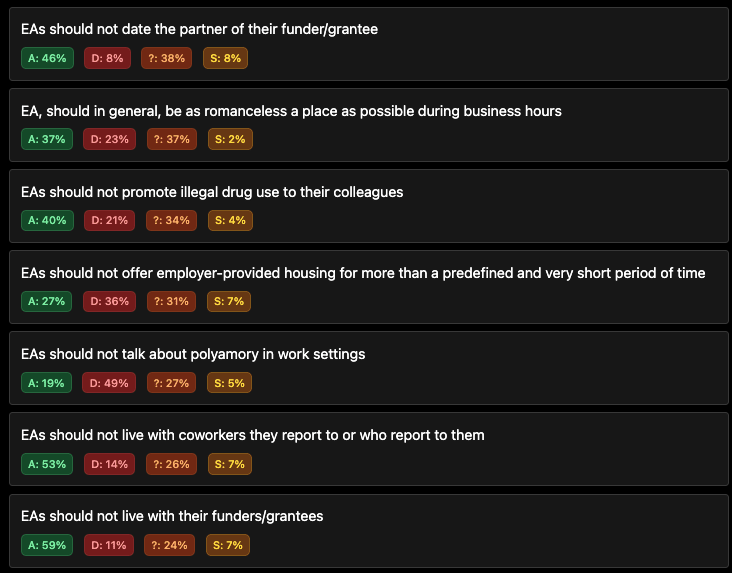There has already been ample discussion of what norms and taboos should exist in the EA community, especially over the past ten months. Below, I'm sharing an incomplete list of actions and dynamics I would strongly encourage EAs and EA organizations to either strictly avoid or treat as warranting a serious—and possibly ongoing—risk analysis.
I believe there is a reasonable risk should EAs:
- Live with coworkers, especially when there is a power differential and especially when there is a direct report relationship
- Date coworkers, especially when there is a power differential and especially when there is a direct report relationship
- Promote[1] drug use among coworkers, including legal drugs, and including alcohol and stimulants
- Live with their funders/grantees, especially when substantial conflict-of-interest mechanisms are not active
- Date their funders/grantees, especially when substantial conflict-of-interest mechanisms are not active
- Date the partner of their funder/grantee, especially when substantial conflict-of-interest mechanisms are not active
- Retain someone as a full-time contractor or grant recipient for the long term, especially when it might not adhere to legal guidelines
- Offer employer-provided housing for more than a predefined and very short period of time, thereby making an employee’s housing dependent on their continued employment and allowing an employer access to an employee’s personal living space
Potentially more controversial, two aspects of the community I believe have substantial downsides that the community has insufficiently discussed or addressed:
- EA™ Group Houses and the branding of private, personal spaces as “EA”
- "Work trials" that require interruption of regular employment to complete, such that those currently employed full-time must leave their existing job to be considered for a prospective job
As said, this list is far from complete and I imagine people may disagree with portions of it. I’m hoping to stake this as a position held by some EAs and I’m hoping this post can serve as a prompt for further discussion and assessment.
- ^
“Promote” is an ambiguous term here. I think this is true to life in that one person’s enthusiastic endorsement of a drug is another person’s peer pressure.





Rockwell - these norms might sound fair, reasonable, and helpful, at first glance.
But they show, IMHO, a strong latent sex-negativity, drug-negativity, and cohousing-negativity that is the diametrical opposite of EA's traditional subculture -- at least until recent years, when 'safetyism' seems to have become prioritized over fun, collegiality, and alternative lifestyles.
Take the issue of 'power differentials', for example. Some people are really attracted to people who are more powerful, higher status, higher prestige, more influential, more famous, wealthier, and/or older. (There is a LOT of psychological research on these kinds of status-seeking mate preferences, which are very common across cultures.) Such people might prefer to 'date coworkers', especially when there is a power differential. This is especially true for the significant proportion of people involved in 'power exchange' relationships (e.g. the BDSM subculture, including Dom/sub relationships). (This is salient to me because I teach Human Sexuality courses at college, and I do research on anti-BDSM and anti-polyamory stigma and prejudice).
So, prohibiting 'power-differential dating' sounds extra 'safe' at first glance. But it would marginalize and stigmatize everybody who's already in a 'power-differential' relationship, or who wants to be -- especially among people who take their EA identity seriously, and who would prefer to date other EAs. (Also, of course, stigmatizing 'power-differential dating' often boils down to ageism, and the stigmatization of relationships that involve 'age gaps'.)
Likewise with the notion that EAs should never promote drug use among coworkers, including legal drugs, and alcohol. Let's be honest here. The expansion of many of our 'moral circles' involved psychedelic experiences that allowed us to think about animal sentience, AI, long-termism, and future people in new ways. For those of us with Aspergers (like me) or other autism-spectrum traits, psychoactive drugs such as MDMA helped us develop empathy, compassion, and capacities for social perspective-taking and connection. For those of us with social awkwardness and introversion, light recreational drugs such as alcohol, cannabis, or modafinil can be crucial in loosening up enough to make friends and network at parties and social events. If EA strongly discourages substance use in all EA-adjacent social events, cohousing communities, and friendship circles, then we may be socially handicapping everyone who isn't neurotypical extrovert.... and we may be keeping our moral circles from growing.
So, in short, I think for any proposed changes to EA subculture norms, we should think very carefully about how these new norms might affect the full range and diversity of people involved in EA, given their actual preferences, experiences, and relationships.
And we should think about whether the new norms are contrary to the traditions of the EA subculture as it's developed over the last dozen years. In my view, EA is a wonderful subculture, full of fascinating and principled people, with unique perspectives and priorities, and I think this has been due, in no small measure, to the relatively sex-positive, drug-positive, and cohousing-positive features of 'Trad EA' culture.
I generally agree that clear, specific conflicts of interest are a bigger problem for relationships that mix professional and sexual roles, than vague 'power differentials' (which could include virtually any differences between partners in their wealth, status, prestige, fame, age, influence, intelligence, citation count, job seniority, etc.)